#conventicle
Text
Alessia bergamo sexy bar
Fudendo com a casada
working pussy, jerking cock
Mata Hari: the secret history of the most famous spy in the world (Full Movies)
Gozei dentro da novinha apertadinha
She Uses Her Pussy To Massage Him
Generous Massage Tutoria From Asia
Young gay amateur jerks off his big dick and cums on himself
My Latina squatting with bearly anything on and wearing high heels
Madison Deck
#bicellular#superconductive#distrainment#patternmaker#outsat#positum#aardvark#Haliver#podler#Eliason#wild-phrased#prison-escaping#bronstrops#scourge#conventicle#full-extended#demethylate#skiwears#overissuing#protravel
0 notes
Text
SCARLET FF X ATRAS RICO SQRITS
Priscilla Salerno scopa forte e si fa inculare
PJGIRLS Klarisa Leone extreme pussy stretching, self-fisting & special gyno
Two boys screw old hairy granny teacher on the floor
White dick fuckin my ebony wifee
Stepbro shows the straight way to lesbian teen stepsis
Handjob cumshot tribute
threesome blonde milf and teen public
Cojiendo de ladito a mi putita
Hot girl squiting
#dinothere#adiathermal#conventicler#cuttings#retrofract#boors#monophyodont#purpuras#declaring#tottenham#procreations#untwirled#bias#anticommercialistic#pelycometry#asthma#solenodont#repudiated#photoregression#visitate
0 notes
Text
POV (SNAPCHAT COMPILATION ) Hood girl gives SUPER DOME to white boy for big facial cumshot
Asian College Students public sex
THICK TEEN STRIPS AND DILDOS
Xxx gay sex doctor big pitcher Sex crazed Drew from Georgia likes to
Culona con licra verde sacudiendo las nalgas siosi
昼間喧嘩した嫁に睾丸マッサージをやってもらった Let my wife who quarreled in the morning did lingam massage
Indian Girl pussy fuck
Indian guy Monu showing his nudity
Excellent smothering home porn with horny couple
transboy suck thje xxl cock lf jess royan
#kittles#porphyrization#prostrate#underratedgirlsedit#inevasible#drug-grinding#unsufficing#rely#field-conventicler#quasi-capably#cees#seaworthiness#geoemtry#pens#bribeworthy#IP#summerier#argoletier#spirited#gloveless
1 note
·
View note
Text
Backshot tease
Vizinha gostosa exibida
se da ricos sentones y la lleno de leche
Smalltitted black ts babe dildoing her ass
Bucetinha teen gostosa sem calsinha novinha
UNE JEUNE FILLE AU SAUNA TAILLE UNE PIPE BAVEUSE ET PREND LE JUS EN BOUCHE
Amateur handjob cumshot ejaculation
Cute straight pinoy guy masturbating gay xxx Fuck Me In the Ass For
Ebony luna corazon gets cumshots lying on the back
Japanese bukkake, Marin as schoolgirl
#lentigerous#conventicles#boigid#Birdt#noncasuistic#Ellmyer#horse-drawn#Claude#zindiq#hastile#tax#illogic#omphalic#dmod#kenosis#urheen#Tunisian#vindemiate#mandalore#Lowellville
0 notes
Text

“Sorry am I bothering you?”
This is probably my favourite scene in 'A Discovery of Witches' episode 1. Matthew just can’t help being borderline annoying. That smirk is never far from his lips. He still suspects Diana but you get the impression that he’s enjoying sparing with her.
We've got both the Real Time Read and the ADOW Conventicle #RealTimeWatch going on at the moment -
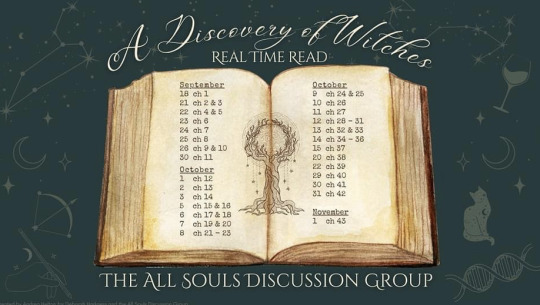
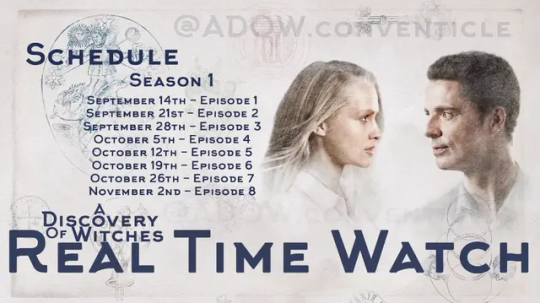
Realistically I'll probably stick with the one episode a week #RealTimeWatch coz i never manage to keep up with the reading 😂
📷 ADOW S1:01 my edit/All Souls Discussion Group/ADOWConventicle
#matthew goode#a discovery of witches#adow#teresa palmer#matthewgoode#real time read#real time watch
30 notes
·
View notes
Text

A.3.7 Are there religious anarchists?
Yes, there are. While most anarchists have opposed religion and the idea of God as deeply anti-human and a justification for earthly authority and slavery, a few believers in religion have taken their ideas to anarchist conclusions. Like all anarchists, these religious anarchists have combined an opposition to the state with a critical position with regards to private property and inequality. In other words, anarchism is not necessarily atheistic. Indeed, according to Jacques Ellul, “biblical thought leads directly to anarchism, and that this is the only ‘political anti-political’ position in accord with Christian thinkers.” [quoted by Peter Marshall, Demanding the Impossible, p. 75]
There are many different types of anarchism inspired by religious ideas. As Peter Marshall notes, the “first clear expression of an anarchist sensibility may be traced back to the Taoists in ancient China from about the sixth century BC” and “Buddhism, particularly in its Zen form, … has … a strong libertarian spirit.” [Op. Cit., p. 53 and p. 65] Some, like the anti-globalisation activist Starhawk, combine their anarchist ideas with Pagan and Spiritualist influences. However, religious anarchism usually takes the form of Christian Anarchism, which we will concentrate on here.
Christian Anarchists take seriously Jesus’ words to his followers that “kings and governors have domination over men; let there be none like that among you.” Similarly, Paul’s dictum that there “is no authority except God” is taken to its obvious conclusion with the denial of state authority within society. Thus, for a true Christian, the state is usurping God’s authority and it is up to each individual to govern themselves and discover that (to use the title of Tolstoy’s famous book) The Kingdom of God is within you.
Similarly, the voluntary poverty of Jesus, his comments on the corrupting effects of wealth and the Biblical claim that the world was created for humanity to be enjoyed in common have all been taken as the basis of a socialistic critique of private property and capitalism. Indeed, the early Christian church (which could be considered as a liberation movement of slaves, although one that was later co-opted into a state religion) was based upon communistic sharing of material goods, a theme which has continually appeared within radical Christian movements inspired, no doubt, by such comments as “all that believed were together, and had all things in common, and they sold their possessions and goods, and parted them all, according as every man has need” and “the multitude of them that believed were of one heart and of one soul, not one of them said that all of the things which he possessed was his own; but they had all things in common.” (Acts, 2:44,45; 4:32)
Unsurprisingly, the Bible would have been used to express radical libertarian aspirations of the oppressed, which, in later times, would have taken the form of anarchist or Marxist terminology). As Bookchin notes in his discussion of Christianity’s contributions to “the legacy of freedom,” ”[b]y spawning nonconformity, heretical conventicles, and issues of authority over person and belief, Christianity created not merely a centralised authoritarian Papacy, but also its very antithesis: a quasi-religious anarchism.” Thus “Christianity’s mixed message can be grouped into two broad and highly conflicting systems of belief. On one side there was a radical, activistic, communistic, and libertarian vision of the Christian life” and “on the other side there was a conservative, quietistic, materially unwordly, and hierarchical vision.” [The Ecology of Freedom, p. 266 and pp. 274–5]
Thus clergyman’s John Ball’s egalitarian comments (as quoted by Peter Marshall [Op. Cit., p. 89]) during the Peasant Revolt in 1381 in England:
“When Adam delved and Eve span,
Who was then a gentleman?” The history of Christian anarchism includes the Heresy of the Free Spirit in the Middle Ages, numerous Peasant revolts and the Anabaptists in the 16th century. The libertarian tradition within Christianity surfaced again in the 18th century in the writings of William Blake and the American Adam Ballou reached anarchist conclusions in his Practical Christian Socialism in 1854. However, Christian anarchism became a clearly defined thread of the anarchist movement with the work of the famous Russian author Leo Tolstoy.
Tolstoy took the message of the Bible seriously and came to consider that a true Christian must oppose the state. From his reading of the Bible, Tolstoy drew anarchist conclusions:
“ruling means using force, and using force means doing to him whom force is used, what he does not like and what he who uses force would certainly not like done to himself. Consequently ruling means doing to others what we would not they should do unto us, that is, doing wrong.” [The Kingdom of God is Within You, p. 242]
Thus a true Christian must refrain from governing others. From this anti-statist position he naturally argued in favour of a society self-organised from below:
“Why think that non-official people could not arrange their life for themselves, as well as Government people can arrange it nor for themselves but for others?” [The Slavery of Our Times, p. 46]
This meant that “people can only be freed from slavery by the abolition of Governments.” [Op. Cit., p. 49] Tolstoy urged non-violent action against oppression, seeing a spiritual transformation of individuals as the key to creating an anarchist society. As Max Nettlau argues, the “great truth stressed by Tolstoy is that the recognition of the power of the good, of goodness, of solidarity — and of all that is called love — lies within ourselves, and that it can and must be awakened, developed and exercised in our own behaviour.” [A Short History of Anarchism, pp. 251–2] Unsurprisngly, Tolstoy thought the “anarchists are right in everything … They are mistaken only in thinking that anarchy can be instituted by a revolution.” [quoted by Peter Marshall, Op. Cit., p. 375]
Like all anarchists, Tolstoy was critical of private property and capitalism. He greatly admired and was heavily influenced by Proudhon, considering the latter’s “property is theft” as “an absolute truth” which would “survive as long as humanity.” [quoted by Jack Hayward, After the French Revolution, p. 213] Like Henry George (whose ideas, like those of Proudhon, had a strong impact on him) he opposed private property in land, arguing that “were it not for the defence of landed property, and its consequent rise in price, people would not be crowded into such narrow spaces, but would scatter over the free land of which there is still so much in the world.” Moreover, “in this struggle [for landed property] it is not those who work in the land, but always those who take part in government violence, who have the advantage.” Thus Tolstoy recognised that property rights in anything beyond use require state violence to protect them as possession is “always protected by custom, public opinion, by feelings of justice and reciprocity, and they do not need to be protected by violence.” [The Slavery of Our Times, p. 47] Indeed, he argues that:
“Tens of thousands of acres of forest lands belonging to one proprietor — while thousands of people close by have no fuel — need protection by violence. So, too, do factories and works where several generations of workmen have been defrauded and are still being defrauded. Yet more do the hundreds of thousands of bushels of grain, belonging to one owner, who has held them back to sell at triple price in time of famine.” [Op. Cit., pp. 47–8]
As with other anarchists, Tolstoy recognised that under capitalism, economic conditions “compel [the worker] to go into temporary or perpetual slavery to a capitalist” and so is “obliged to sell his liberty.” This applied to both rural and urban workers, for the “slaves of our times are not only all those factory and workshop hands, who must sell themselves completely into the power of the factory and foundry owners in order to exist; but nearly all the agricultural labourers are slaves, working as they do unceasingly to grow another’s corn on another’s field.” Such a system could only be maintained by violence, for “first, the fruit of their toil is unjustly and violently taken form the workers, and then the law steps in, and these very articles which have been taken from the workmen — unjustly and by violence — are declared to be the absolute property of those who have stolen them.” [Op. Cit., p. 34, p. 31 and p. 38]
Tolstoy argued that capitalism morally and physically ruined individuals and that capitalists were “slave-drivers.” He considered it impossible for a true Christian to be a capitalist, for a “manufacturer is a man whose income consists of value squeezed out of the workers, and whose whole occupation is based on forced, unnatural labour” and therefore, “he must first give up ruining human lives for his own profit.” [The Kingdom Of God is Within You, p. 338 and p. 339] Unsurprisingly, Tolstoy argued that co-operatives were the “only social activity which a moral, self-respecting person who doesn’t want to be a party of violence can take part in.” [quoted by Peter Marshall, Op. Cit., p. 378]
So, for Tolstoy, “taxes, or land-owning or property in articles of use or in the means of production” produces “the slavery of our times.” However, he rejected the state socialist solution to the social problem as political power would create a new form of slavery on the ruins of the old. This was because “the fundamental cause of slavery is legislation: the fact that there are people who have the power to make laws.” This requires “organised violence used by people who have power, in order to compel others to obey the laws they (the powerful) have made — in other words, to do their will.” Handing over economic life to the state would simply mean “there will be people to whom power will be given to regulate all these matters. Some people will decide these questions, and others will obey them.” [Tolstoy, Op. Cit., p. 40, p. 41, p. 43 and p. 25] He correctly prophetised that “the only thing that will happen” with the victory of Marxism would be “that despotism will be passed on. Now the capitalists are ruling, but then the directors of the working class will rule.” [quoted by Marshall, Op. Cit., p. 379]
From his opposition to violence, Tolstoy rejects both state and private property and urged pacifist tactics to end violence within society and create a just society. For Tolstoy, government could only be destroyed by a mass refusal to obey, by non-participation in govermmental violence and by exposing fraud of statism to the world. He rejected the idea that force should be used to resist or end the force of the state. In Nettlau’s words, he “asserted … resistance to evil; and to one of the ways of resistance — by active force — he added another way: resistance through disobedience, the passive force.” [Op. Cit., p. 251] In his ideas of a free society, Tolstoy was clearly influenced by rural Russian life and aimed for a society based on peasant farming of communal land, artisans and small-scale co-operatives. He rejected industrialisation as the product of state violence, arguing that “such division of labour as now exists will … be impossible in a free society.” [Tolstoy, Op. Cit., p. 26]
Tolstoy’s ideas had a strong influence on Gandhi, who inspired his fellow country people to use non-violent resistance to kick Britain out of India. Moreover, Gandhi’s vision of a free India as a federation of peasant communes is similar to Tolstoy’s anarchist vision of a free society (although we must stress that Gandhi was not an anarchist). The Catholic Worker Group in the United States was also heavily influenced by Tolstoy (and Proudhon), as was Dorothy Day a staunch Christian pacifist and anarchist who founded it in 1933. The influence of Tolstoy and religious anarchism in general can also be found in Liberation Theology movements in Latin and South America who combine Christian ideas with social activism amongst the working class and peasantry (although we should note that Liberation Theology is more generally inspired by state socialist ideas rather than anarchist ones).
So there is a minority tradition within anarchism which draws anarchist conclusions from religion. However, as we noted in section A.2.20, most anarchists disagree, arguing that anarchism implies atheism and it is no coincidence that the biblical thought has, historically, been associated with hierarchy and defence of earthly rulers. Thus the vast majority of anarchists have been and are atheists, for “to worship or revere any being, natural or supernatural, will always be a form of self-subjugation and servitude that will give rise to social domination. As [Bookchin] writes: ���The moment that human beings fall on their knees before anything that is ‘higher’ than themselves, hierarchy will have made its first triumph over freedom.’” [Brian Morris, Ecology and Anarchism, p. 137] This means that most anarchists agree with Bakunin that if God existed it would be necessary, for human freedom and dignity, to abolish it. Given what the Bible says, few anarchists think it can be used to justify libertarian ideas rather than support authoritarian ones and are not surprised that the hierarchical side of Christianity has predominated in its long (and generally oppressive) history.
Atheist anarchists point to the fact that the Bible is notorious for advocating all kinds of abuses. How does the Christian anarchist reconcile this? Are they a Christian first, or an anarchist? Equality, or adherence to the Scripture? For a believer, it seems no choice at all. If the Bible is the word of God, how can an anarchist support the more extreme positions it takes while claiming to believe in God, his authority and his laws?
For example, no capitalist nation would implement the no working on the Sabbath law which the Bible expounds. Most Christian bosses have been happy to force their fellow believers to work on the seventh day in spite of the Biblical penalty of being stoned to death (“Six days shall work be done, but on the seventh day there shall be to you an holy day, a sabbath of rest to the Lord: whosoever doeth work therein shall be put to death.” Exodus 35:2). Would a Christian anarchist advocate such a punishment for breaking God’s law? Equally, a nation which allowed a woman to be stoned to death for not being a virgin on her wedding night would, rightly, be considered utterly evil. Yet this is the fate specified in the “good book” (Deuteronomy 22:13–21). Would premarital sex by women be considered a capital crime by a Christian anarchist? Or, for that matter, should “a stubborn and rebellious son, which will not obey the voice of his father, or the voice of his mother” also suffer the fate of having “all the men of his city … stone him with stones, that he die”? (Deuteronomy 21:18–21) Or what of the Bible’s treatment of women: “Wives, submit yourselves unto your own husbands.” (Colossians 3:18) They are also ordered to “keep silence in the churches.” (I Corinthians 14:34–35). Male rule is explicitly stated: “I would have you know that the head of every man is Christ; and the head of the woman is the man; and the head of Christ is God.” (I Corinthians 11:3)
Clearly, a Christian anarchist would have to be as highly selective as non-anarchist believers when it comes to applying the teachings of the Bible. The rich rarely proclaim the need for poverty (at least for themselves) and seem happy to forgot (like the churches) the difficulty a rich man apparently has entering heaven, for example. They seem happy to ignore Jesus’ admonition that “If thou wilt be perfect, go and sell that thou hast, and give to the poor, and thou shalt have treasure in heaven: and come and follow me.” (Matthew 19:21). The followers of the Christian right do not apply this to their political leaders, or, for that matter, their spiritual ones. Few apply the maxim to “Give to every man that asketh of thee; and of him that taketh away thy goods ask them not again.” (Luke 6:30, repeated in Matthew 5:42) Nor do they hold “all things common” as practised by the first Christian believers. (Acts 4:32) So if non-anarchist believers are to be considered as ignoring the teachings of the Bible by anarchist ones, the same can be said of them by those they attack.
Moreover idea that Christianity is basically anarchism is hard to reconcile with its history. The Bible has been used to defend injustice far more than it has been to combat it. In countries where Churches hold de facto political power, such as in Ireland, in parts of South America, in nineteenth and early twentieth century Spain and so forth, typically anarchists are strongly anti-religious because the Church has the power to suppress dissent and class struggle. Thus the actual role of the Church belies the claim that the Bible is an anarchist text.
In addition, most social anarchists consider Tolstoyian pacifism as dogmatic and extreme, seeing the need (sometimes) for violence to resist greater evils. However, most anarchists would agree with Tolstoyians on the need for individual transformation of values as a key aspect of creating an anarchist society and on the importance of non-violence as a general tactic (although, we must stress, that few anarchists totally reject the use of violence in self-defence, when no other option is available).
#faq#anarchy faq#revolution#anarchism#daily posts#communism#anti capitalist#anti capitalism#late stage capitalism#organization#grassroots#grass roots#anarchists#libraries#leftism#social issues#economy#economics#climate change#climate crisis#climate#ecology#anarchy works#environmentalism#environment#solarpunk#anti colonialism#mutual aid#cops#police
10 notes
·
View notes
Text
Day 12

Liber Liberi vel Lapidis Lazuli
III
1. I was the priest of Ammon-Ra in the temple of Ammon-Ra at Thebai.
2. But Bacchus came singing with his troops of vine-clad girls, of girls in dark mantles; and Bacchus in the midst like a fawn!
3. God! how I ran out in my rage and scattered the chorus!
4. But in my temple stood Bacchus as the priest of Ammon-Ra.
5. Therefore I went wildly with the girls into Abyssinia; and there we abode and rejoiced.
6. Exceedingly; yea, in good sooth!
7. I will eat the ripe and the unripe fruit for the glory of Bacchus.
8. Terraces of ilex, and tiers of onyx and opal and sardonyx leading up to the cool green porch of malachite.
9. Within is a crystal shell, shaped like an oyster — O glory of Priapus! O beatitude of the Great Goddess!
10. Therein is a pearl.
11. O Pearl! thou hast come from the majesty of dread Ammon-Ra.
12. Then I the priest beheld a steady glitter in the heart of the pearl.
13. So bright we could not look! But behold! a blood-red rose upon a rood of glowing gold!
14. So I adored the God. Bacchus! thou art the lover of my God!
15. I who was priest of Ammon-Ra, who saw the Nile flow by for many moons, for many, many moons, am the young fawn of the grey land.
16. I will set up my dance in your conventicles, and my secret loves shall be sweet among you.
17. Thou shalt have a lover among the lords of the grey land.
18. This shall he bring unto thee, without which all is in vain; a man’s life spilt for thy love upon My Altars.
19. Amen.
20. Let it be soon, O God, my God! I ache for Thee, I wander very lonely among the mad folk, in the grey land of desolation.
21. Thou shalt set up the abominable lonely Thing of wickedness. Oh joy! to lay that corner-stone!
22. It shall stand erect upon the high mountain; only my God shall commune with it.
23. I will build it of a single ruby; it shall be seen from afar off.
24. Come! let us irritate the vessels of the earth: they shall distil strange wine.
25. It grows under my hand: it shall cover the whole heaven.
26. Thou art behind me: I scream with a mad joy.
27. Then said Ithuriel the strong; let Us also worship this invisible marvel!
28. So did they, and the archangels swept over the heaven.
29. Strange and mystic, like a yellow priest invoking mighty flights of great grey birds from the North, so do I stand and invoke Thee!
30. Let them obscure not the sun with their wings and their clamour!
31. Take away form and its following!
32. I am still.
33. Thou art like an osprey among the rice, I am the great red pelican in the sunset waters.
34. I am like a black eunuch; and Thou art the scimitar. I smite off the head of the light one, the breaker of bread and salt.
35. Yea! I smite — and the blood makes as it were a sunset on the lapis lazuli of the King’s Bedchamber.
36. I smite! The whole world is broken up into a mighty wind, and a voice cries aloud in a tongue that men cannot speak.
37. I know that awful sound of primal joy; let us follow on the wings of the gale even unto the holy house of Hathor; let us offer the five jewels of the cow upon her altar!
38. Again the inhuman voice!
39. I rear my Titan bulk into the teeth of the gale, and I smite and prevail, and swing me out over the sea.
40. There is a strange pale God, a god of pain and deadly wickedness.
41. My own soul bites into itself, like a scorpion ringed with fire.
42. That pallid God with face averted, that God of subtlety and laughter, that young Doric God, him will I serve.
43. For the end thereof is torment unspeakable.
44. Better the loneliness of the great grey sea!
45. But ill befall the folk of the grey land, my God!
46. Let me smother them with my roses!
47. Oh Thou delicious God, smile sinister!
48. I pluck Thee, O my God, like a purple plum upon a sunny tree. How Thou dost melt in my mouth, Thou consecrated sugar of the Stars!
49. The world is all grey before mine eyes; it is like an old worn wine-skin.
50. All the wine of it is on these lips.
51. Thou hast begotten me upon a marble Statue, O my God!
52. The body is icy cold with the coldness of a million moons; it is harder than the adamant of eternity. How shall I come forth into the light?
53. Thou art He, O God! O my darling! my child! my plaything! Thou art like a cluster of maidens, like a multitude of swans upon the lake.
54. I feel the essence of softness.
55. I am hard and strong and male; but come Thou! I shall be soft and weak and feminine.
56. Thou shalt crush me in the wine-press of Thy love. My blood shall stain Thy fiery feet with litanies of Love in Anguish.
57. There shall be a new flower in the fields, a new vintage in the vineyards.
58. The bees shall gather a new honey; the poets shall sing a new song.
59. I shall gain the Pain of the Goat for my prize; and the God that sitteth upon the shoulders of Time shall drowse.
60. Then shall all this which is written be accomplished: yea, it shall be accomplished
9 notes
·
View notes
Note
first of all, very happy to hear physical therapy is working and that you're doing better! second of all, ever since annatar talked with his selves back in mandos, this question has been bugging me: what would the collective noun of saurons even be called? XD "a shroud of annatars" because shadows? or like "a conventicle of annatars" because... [gestures vaguely at everything]? or something else?
Omg HILARIOUS question
Possibly an argument, given that he cannot agree with himself about anything. XD
13 notes
·
View notes
Text
[Henry VII] followed the Yorkists in his personal judicial dynamism, sending out blistering letters like those to Sir William Say and Sir John Fortescue informing them that he had heard of their intention of confronting one another with 'unlawful assemblies and conventicles of our people' at the next sessions of the peace in Hertfordshire, warning them not to do anything 'repugnant to the equity of our laws or rupture of our said peace, at your uttermost peril', and summoning them to Westminster so he could deal with their dispute. From early in the reign, Henry used his council as a forum for this personal drive to impose good order, taking notes in his own hand of the witnesses' depositions when Lord Dacre of the North appeared before the council accused of riot in 1488-9.
— Steven Gunn, Early Tudor Government 1485-1558
8 notes
·
View notes
Text

guildhalls,
basilicas, arenas, conservatories, treasuries, oratories, martellos, asylums, manufacturies, conventicles, hospices, lazarets, mills, refectories,
deadhouses, abattoirs
22 notes
·
View notes
Photo
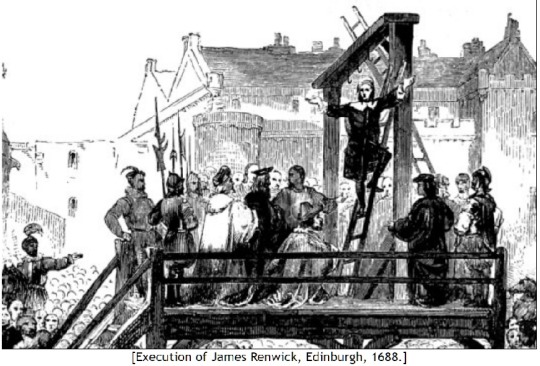
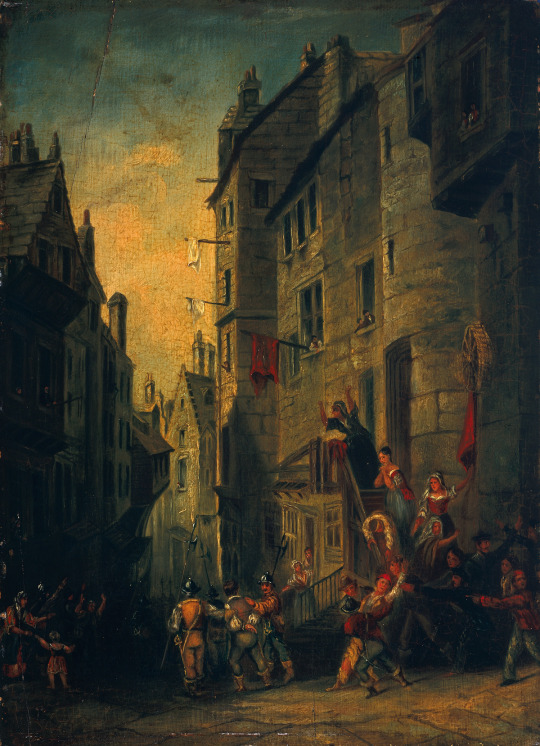
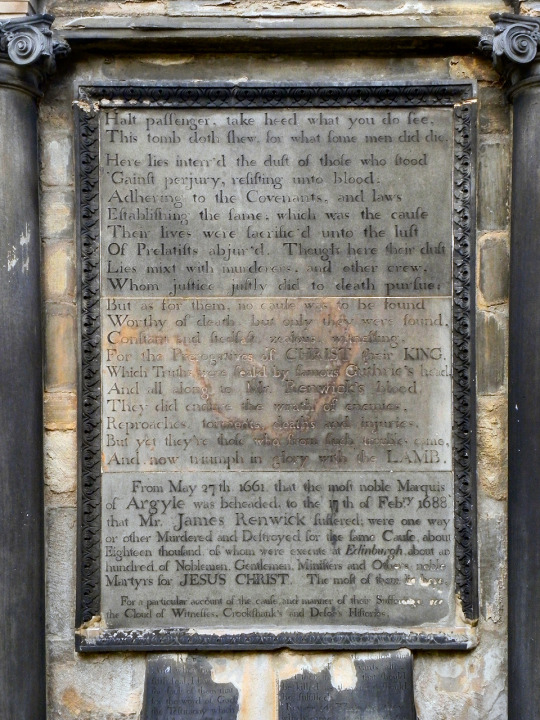
On February 17th 1688 the Scottish Covenanter Minister James Renwick was executed in Edinburgh.
A direct follow on from my post earlier in the week.
Though none of the crowd that thronged Edinburgh’s Grassmarket this day in 1688 could know it, that date’s execution of minister James Renwick would make an end to the shameful period in Scotland we call The Killing Time.
Renwick was the last of many Covenanters who submitted to the public executioner; only a few months yet remained when officers in the field were empowered to force an oath of abjuration upon suspected dissidents, on pain of summary death in the field.
The son of a village weaver, Renwick manifested a martyr’s uncommon zeal for the faith early in life and matriculated at the University of Edinburgh. There in 1681 he witnessed the hanging of Covenanter preacher Donald Cargill.
After studying — and ordination — abroad in the Netherlands Renwick returned to his native soil in 1683. He managed some five years of secret ministering in hidden homes and conventicles, and all the while the law sought him ever closer. By the time it finally hunted him to ground in 1688, so many of the faith’s august champions had already taken their martyrs’ crowns that at age 25 Renwick was among the biggest game remaining.
How often cowled on ghostly moors by torchlight had the young reverend rehearsed the steadfast refusal he might one day deliver to his persecutors? Had he prayed that the weakness of flesh would not betray his spirit with an unbecoming attachment to his own life? “I cannot own this usurper as the lawful king, seeing both by the word of God such an one is incapable to bear rule, and likewise by the ancient laws of the kingdom which admit none to the crown of Scotland until he swear to defend their religion, which a man of his profession cannot do,” he declared to his captors when pressed for the formula of abjuration.
Renwick passed this test but little could even he have imagined how speedily would be fulfilled his gallows prayer recorded as such;
Lord, I die in the faith that Thou wilt not leave Scotland, but that Thou wilt make the blood of Thy witnesses the seed of Thy church, and return again and be glorious in our land. And now, Lord, I am ready.
The captain who finally caught Renwick is supposed to have exclaimed at seeing his youth, “Is this the boy Renwick that the nation has been so much troubled with?” The outlaw minister turned 26 two days before his execution.
His young years would not save him from the gallows though It is believed he was betrayed by a fellow Covenanter during a secret meeting in Edinburgh
The persecutions of Covenanters would end with the removal of King James and the ascension of William of Orange and his wife Mary (James’ daughter) to the thrones of Scotland and England in the ‘Glorious Revolution’ of 1688.
He is celebrated as the last of the martyrs of the covenant, James Guthrie being one of the first. The two are thus commemorated in the inscription upon the ‘martyrs' monument’ in the kirkyard at Greyfriars' Kirk, where the original Covenant of 1638 has been signed.
The monument in the last pic marks Renwick's burial-place, being fixed to the wall close to the spot where criminals were interred, the paintings by Thomas Allon is titled Condemned Covenanters on Their Way to Execution in the West Bow, Edinburgh
19 notes
·
View notes
Text
“ You fudge it ! “
You may heard this " fuding the books" or " You fudge it " The expression comes from Captain Fudge, known as Lying Fudge. He was the captain of the Black Eagle which was to transport 55 Quakers in August 1665 from the Newgate to the colonies as a punishment for offfences against the Conventicle Act. Delayed at Gravesend, by October 19 prisoners and some crew members had died of the plague. Fudge was arrested for dept and his remaining crew mutinied.
In February 1666 the ship at last left for the West Indies, but was seized by a Dutch privateer and the Quakers were freed. Israel d'Israeli, the father of the Prime Minister Benjamin D' Israeli, wrote in 1791: There was, sir, in our time one Captain Fudge, who upon his return from a voyage, how ill- fraught soever hos books, always brought home a good cargo of lies, so much that now aboard ship the sailors, when they hear a great lie, cry out " You fudge it!"
And it was precisely these behaviour that sent Captain Fudge to prison for falsifying books and telling lies. And not that he had to go to prison, he had always lied to his crew, so that at some point they got fed up and mutinied.
47 notes
·
View notes
Text
We must, therefore, obey the presbyters in the Church. They are the successors of the apostles, and by the Father’s good pleasure, they have received, together with the succession in the episcopate, the sure charism of the truth. The others, the people who have broken away from the original succession to set up in various places conventicles of their own, are to be regarded with suspicion. They are heretics with false opinions, or schismatics puffed up and self-indulgent, or again hypocrites interested only in money and vainglory...There are some who are regarded by many as presbyters. In fact, they serve their own lusts and do not give the fear of God priority in their hearts. They insult other people and swell with pride at the thought of their superior position...Of them the Lord said: ‘If the wicked servant says to himself, “My master is delayed”, and begins to beat his fellow servants and maids, and eats and drinks and gets drunk, the master of that servant will come on a day he is not expecting and at an hour he does not know, and will cut him short and assign him a place with the unbelievers’ (Matt 24:48). We must keep away from all such persons, but stay close to those who, as we have said, preserve the succession of the apostles, and who, together with the order of priesthood, display sound speech and blameless conduct as an example to others and for their improvement...As St. Paul, with a good conscience, said to the Corinthians: ‘We are not, like so many, adulterators of God’s Word, but with sincerity, as from God, before God in Christ we speak’ (2 Cor 2:17)...Such priests nourish the Church...St. Paul tells us where we can find them: ‘God has appointed in the Church first apostles, second prophets, third teachers’ (1 Cor 12:28). Where God has placed His gifts, we must learn the truth, that is to say, from those in whom we find succession from the apostles in the Church, sound and blameless conduct, and incorruptible purity of teaching.
Saint Irenaeus of Lyon, The Scandal of the Incarnation
2 notes
·
View notes
Photo
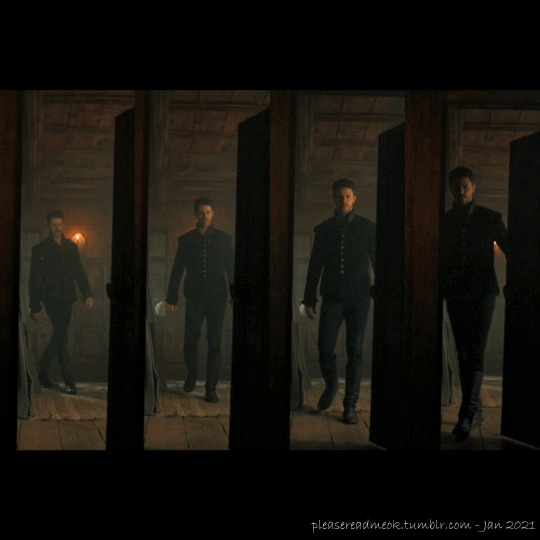
Closing the door on another Real Time Read of ‘Shadow of Night’.
ADOW.conventicle will start a read of ‘The Book of Life’ at the end of May.
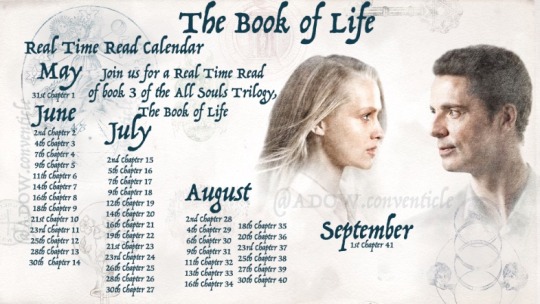
📷 ADOW S2:10 my edit /ADOW Conventicle
18 notes
·
View notes
Quote
In the wings waited another whose prospects and hopes were all blighted. Enter Elizabeth Darrell. Questioned on 14 June [1536] about his part in the 'conventicle' to restore Mary, Francis Bryan confessed a conversation with Bess Darrell. She had 'desired him to be her friend in such su[its] as she had to make'. The first was to 'move' Cromwell to help her to get the three hundred marks Queen Katherine had bequeathed 'towards her marriage'. But the King, who repudiated Katherine as his wife, claimed her property as her widower, and though Cromwell made a note of 'Besse Darrell' in his mermoranda he could do little to help. Neither her bequest nor a marriage was forthcoming.
Secondly, 'seeing she saw no hope in Mary,' she besought Bryan that 'he would help her to be with the Queen.' 'Why,' quoth he, 'what mean to say ye see no hope in the lady Mary?' 'I think and hear say she will not [be] obedient to the King'. But Bryan did not know or ask what Bess had heard of Mary's disobedience. Probably Bess was too far compromised by her closeness to Queen Katherine for Queen Jane to take her to service. Instead, Bess turned once more to those whose allegiance she shared but whose disobedience had alarmed her: to Lady Mary and the Marchioness of Exeter. In January 1537, and again in 1538, Mary made payments to 'Mistress Elizabeth Dorrell', in gratitude for her loyalty to her mother, and to sustain her in her distress.
Thomas Wyatt: the Heart’s Forest (Brigden, Susan) [2012]
#yeah...there's nothing that connects JS to c.oa as much as tradition claims; really#maybe superficially.#'but she was her lady in waiting' yeah? so was AB.
1 note
·
View note